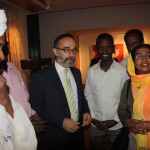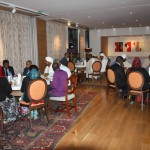29th July 2013
Ramadan
Traditionally the embassy hosts a large Iftar for our Sudanese friends and partners. This year we are doing things a little differently. I am hosting half a dozen smaller Iftars to which we have invited 20 or 30 guests only.
I am enjoying these Iftars greatly. They are special events. It is clear that for Sudanese Ramadan is a special time of year. A time for reflection, for spiritual regeneration and for being with friends and families. It’s a time for tradition and for doing things the way they have always been done. This comes across from our friends at the Iftars. They generate a warmth, a contentment, a pleasure at being together with friends and colleagues. I am neither Sudanese nor muslim, but it’s a great pleasure to share in, and to host, what is a very Sudanese occasion. The mood is quite different from events we host at other times of the year.
The conversations turn about subjects close to the heart during Ramadan: the rhythms of the day during this special month, looking forward to reunions with friends and families over Eid, discussions about whether it’s unusually hotter or cooler than last year, than it should be…. and the issues of daily life: looking after the family, running the business, finding a job, politics, the economy.
It’s not for me to say whether, and if so how, Ramadan might impact on these bigger issues. It is, I understand, traditionally a time for peace and reconciliation. If that spirit can be taken forward by all those involved in the challenges Sudan faces, beit conflict, internal dialogue, tackling poverty or relations with South Sudan it would greatly help to move those issues forward. On all these issues the UK continues to be supportive and to play an active role with Sudanese partners.
It is encouraging, and reflective of the spirit of Ramadan, that Sudan has allowed more time for the two commissions set up by the AU and IGAD to investigate allegations of cross-border support to rebels and to define the “zero line” between Sudan and South Sudan. This is sensible, particularly at a time when the political situation in South Sudan is uncertain.
But more fundamentally the two countries, sharing the longest border in Africa, with a common history and mutual economic interests, simply have to learn to live together. The blueprint for how to do that is the package of agreements agreed in Addis last September. Also now agreed is a detailed, time-specific matrix setting out how and when the agreements should be implemented. Both sides should honour those commitments. Not only because doing so is in the interests of their neighbour (although that is certainly true); but because the implementation of the package is in each country’s own interest. If altruism is not enough, self-interest should be.

